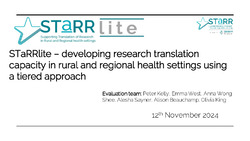Please use this identifier to cite or link to this item:
http://hdl.handle.net/11054/2904| Title: | STaRRlite – developing research translation capacity in rural and regional health settings using a tiered approach. |
| Author: | Kelly, P. Wong Shee, Anna Sayner, Alesha West, E. Beauchamp, A. King, O. |
| Issue Date: | 2024 |
| Conference Name: | Western Alliance Annual Symposium |
| Conference Date: | November 11-12 |
| Conference Place: | Lorne, Australia |
| Abstract: | Background/aim: Developing research capacity and capability in rural and regional health settings is key to improving the translation and use of research in health practice. Western Alliance’s Supporting Translation of Research in Rural and Regional Health Settings (STaRR) program was established in 2020 to develop research translation capability. STaRR is an intensive 10-week mentored training program that supports emerging practitioner-researchers develop and lead a research project. In recognition of a cohort of practitioners motivated to develop their research knowledge but not lead a research project, we have developed STaRRlite. This study investigates the impact of STaRRlite on participants’ research and quality improvement (QI) knowledge. Population/setting: Health practitioners from rural and regional health settings in western Victoria who participated in STaRRlite. Methods: STaRRlite is a single half-day online research workshop open to practitioners with minimal or no research training or experience that covers five domains: different forms of evidence to inform practice; steps to developing a QI or research project; developing a research question; common research designs, and resources available to support research and QI. An integrated pre- and post-workshop survey was administered immediately after the workshop. The survey was administered again after six months. Results/findings: Sixty-three of the 96 STaRRlite participants completed the initial integrated pre- post-workshop survey. Approximately half of the survey participants represented Modified Monash (MM) 2 areas and approximately one third represented MM3-5 areas. Participants were from nursing (35%), allied health (33%), medicine (8%), program officer, mental health, and other (24%) backgrounds. Almost half held a managerial or leadership role. Participants reported improvements in their knowledge across the five domains covered in STaRRlite. Eight STaRRlite participants have progressed to the STaRR mentored training program. The six-month post-workshop surveys are currently underway. Conclusion: An introductory-level research training workshop, requiring comparatively low resources and commitment from participants, can improve research and QI knowledge in rural and regional practitioners. Translational impact/implications for future practice: STaRRlite complements the more intensive and involved STaRR mentored training program and provides an accessible pathway to research training for novice practitioner-researchers. Further research investigating the mid to longer term impacts of lower versus higher resource and intensity research training is warranted. |
| URI: | http://hdl.handle.net/11054/2904 |
| Internal ID Number: | 02881 |
| Health Subject: | CAPACITY BUILDING RESEARCH TRANSLATION RESEARCH REGIONAL HEALTHCARE |
| Type: | Conference Presentation |
| Appears in Collections: | Research Output |
Files in This Item:
| File | Description | Size | Format | |
|---|---|---|---|---|
| WA Symposium - STaRRlite presentation.pdf | 590.92 kB | Adobe PDF |  View/Open |
Items in DSpace are protected by copyright, with all rights reserved, unless otherwise indicated.
